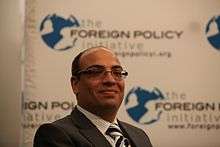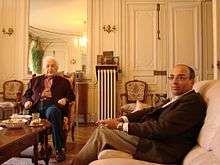Mehdi Khalaji
Mehdi Khalaji (Persian: مهدی خلجی, born 21 September 1973) is an Iranian-American writer, scholar of Islamic studies, political analyst and a former Shia cleric.[2] He has been researching at the Washington Institute for Near East Policy since 2005, and is now a senior research fellow focusing on the politics of Iran and Shiite groups in the Middle East. He has frequently contributed to media outlets such as The Guardian, BBC, The Washington Post, and The New York Times. Khalaji is an American citizen.
Mehdi Khalaji | |
|---|---|
 Mehdi Khalaji in 2009 | |
| Born | Mehdī Khalajī September 21, 1973 |
| Nationality | Iranian |
| Citizenship | United States |
| Alma mater | Qom Seminary[1] |
| Occupation |
|
| Organization | Washington Institute for Near East Policy |
| Political party | Democratic Party[1] |
| Spouse(s) | Marjan Sheikholeslami |
Education and career

A native from Qom, the center for Shi'a scholarship in Iran, Khalaji studied Islamic theology in Qom Seminary, and Philosophy in Tarbiat Modarres University.[3]
From 1986 to 2000, Khalaji trained in the seminaries of Qom, the traditional center of Iran's clerical establishment. There he studied theology and jurisprudence, earning a doctorate and thoroughly researched on modern intellectual and philosophical-political developments in Iran and the wider Islamic and Western worlds. In Qom, and later in Tehran, Khalaji launched a career in journalism, first serving on the editorial board of a theological journal, Naqd va Nazar, and then the daily Entekhab. In addition to his own writing, he has translated the works of the Islamic humanist scholar Muhammad Arkoun and other modernist Muslim intellectuals.[4]
In 1993, Khalaji became a contributor to Kiyan monthly magazine, which at the time was the main voice of religious intellectuals in Iran.
In 2000, Khalaji moved to Paris where he studied Shiite theology and exegesis in the but didn't earn any degree or certificate Ecole Pratique des Hautes Etudes. He also worked for BBC Persian as a political analyst on Iranian affairs, eventually becoming a broadcaster for the Prague-based Radio Farda, the Persian-language service of the U.S. government's Radio Free Europe/Radio Liberty. At Radio Farda, he produced news, features, and analysis on a range of Middle Eastern, Iranian, and Islamic issues.
In 2005, Mehdi Khalaji became a senior fellow at The Washington Institute, focusing on the politics of Iran and Shiite groups in the Middle East. A Shiite theologian by training, Khalaji has also served on the editorial boards of two prominent Iranian periodicals and produced for the BBC as well as the U.S. government's Persian news service. He is a frequent contributor in PolicyWatch and PeaceWatch segments submitted by the Washington Institute for Near East Policy. He has participated in many panels including one in November 2006 when he appeared on a panel run by American Foreign Policy Council, titled "Understanding the Iranian Threat", along with James Woolsey, Ilan Berman, and Patrick Clawson. He is a writer and contributor for numerous English-language and Persian-language media entities. He also teaches Persian-language webinars on Quran'ic interpretation for Tavaana: E-Learning Institute for Iranian Civil Society.[5]
Father's arrest
On January 12, 2010, Mehdi Khalaji’s father, Mohammad Taghi Khalaji, was arrested in Iran.[6] A report from The Washington Institute for Near East Policy stated that agents of Iran's Ministry of Intelligence, conducted a violent house search, confiscating personal files, books, letters, a computer, satellite receiver and the family's passports. Mehdi Khalaji's daughter's passport was among those confiscated. Khalaji's family was banned from leaving Iran.[7]
Views
Khalaji has written an opinion piece in New York Times on why he is against Iran deal.[8]
Controversies
In March 2019 Khalaji and his wife, Marjan Sheikholeslami Aleagha, were listed among the main suspects in the largest financial corruption case in Iranian history with a total amount of 6.7 billion euros. Khalaji and his wife are suspected that they made contracts with Islamic Revolutionary Guard Corps oil and gas company, Sepanir, and in order to bypass sanctions they used personal accounts which were used to embezzle money to United States and Canada.[9][10]
Publications
- Booklets
- Apocalyptic Politics: On the Rationality of Iranian Politics
- Through the Veil: The Role of Broadcasting in U.S. Public Diplomacy toward Iranians
- The Last Marja: Sistani and the End of Traditional Religious Authority in Shiism
- Books
- Natani (novel in Persian, published in Berlin by Nashr-e Gardoon)
- The New Order of the Clerical Establishment in Iran: Nazm-e Novin-e Rohaniat Dar Iran (Persian Edition)(Amazon link)
References
- "An Interview with Mehdi Khalaji (Part One)". Be Ebarate Digar (Interview). Interviewed by Enayat Fani. London: BBC Persian. 10 January 2017.
Tarbiat Modares University - https://foreignpolicy.com/2009/07/27/interview-mehdi-khalaji/
- The Islamic Propagation Office of the Islamic Seminary of Qom Archived 2007-03-14 at the Wayback Machine
- "Mehdi Khalaji". The Washington Institute. Retrieved 10 February 2016.
- "Mehdi Khalaji". Tavaana. Retrieved 3 September 2014.
- Rozen, Laura. "Iran arrests father of U.S. think tank scholar". Politico. Retrieved 18 November 2016.
- "Father of Washington Institute Iran Expert Arrested in Qom; Family Banned from Leaving Country" (PDF). The Washington Institute for Near East Policy. Retrieved 30 November 2016.
- https://nytimes.com/2015/04/27/opinion/iran-wont-give-up-on-its-revolution.html
- https://www.asriran.com/fa/news/657496/مرجان-شیخالاسلامی-آلآقا-متهم-اقتصادی-فراری-است
- http://www.entekhab.ir/fa/news/463704/مرجان-شیخ-الاسلامی-شریک-متهم-پرونده-فساد-در-پتروشیمی-با-مبلغی-کلان-به-خارج-از-کشور-متواری-شده-جزئیاتی-تکاندهنده-از-پرونده-۶۶-میلیارد-یورویی-پتروشیمی-بزرگترین-کلاهبرداری-تاریخ-ایران
External links
| Wikimedia Commons has media related to Mehdi Khalaji. |